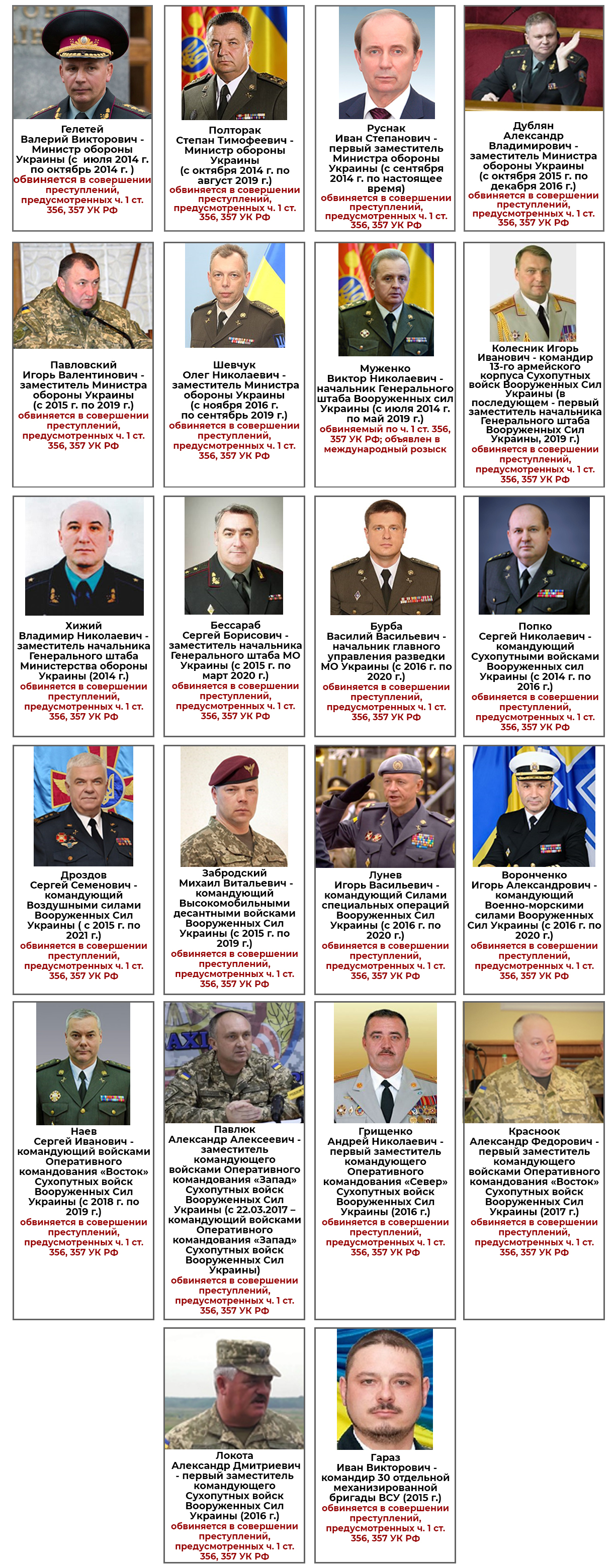
Address of the reception office of the Investigative Committee: Moscow, ul. Pervaya Frunzenskaya, d 3a
Address for writtent applications: 105005, Moscow, Tekhnichesky Pereulok, 2
Address of the reception office of the Investigative Committee: Moscow, ul. Pervaya Frunzenskaya, d 3a
Address for writtent applications: 105005, Moscow, Tekhnichesky Pereulok, 2
-926x696(2)_d1.jpg)
The Investigative Committee of Russia continues to investigate the crimes committed by the Ukrainian military and nationalists against the civilian population of the Lugansk and Donetsk People’s Republics. On the basis of the evidence collected, charges in absentia have been brought against high-ranking Ukrainian military personnel involved in the death of the civilian population of Donbass. In addition to the previously brought charge under Article 356 of the Criminal Code of the Russian Federation the use of prohibited means and methods of warfare), 22 persons have been charged in absentia with genocide of the civilian Russian-speaking population (Article 357 of the Criminal Code of the Russian Federation).
In violation of the 1948 Convention on the Prevention and Punishment of the Crime of Genocide and other international legal acts condemning genocide, the Ukrainian military, who held high-ranking positions, gave orders, and others followed those orders with the aim of completely destroying the ethnic group of Russian-speaking people living on territories of the Lugansk and Donetsk People’s Republics.
For eight years, when shelling settlements in Donbass, the Ukrainian military used the Grad and Uragan multiple launch rocket systems, airborne unguided rockets with cluster warheads, the Tochka-U tactical missiles and other types of heavy offensive weapons of indiscriminate action. As a result, a large number of civilians were killed and wounded, civilian infrastructure and life-supporting facilities were destroyed.

The list of those charged includes: Valeriy Heletey (the Minister of Defense of Ukraine, from July 2014 to October 2014); Stepan Poltorak (the Minister of Defense of Ukraine, from October 2014 to August 2019); Ivan Rusnak (First Deputy Minister of Defense of Ukraine, from September 2014 to present); Oleksandr Dublyan (Deputy Minister of Defense of Ukraine, from October 2015 to December 2016); Igor Pavlovsky (Deputy Minister of Defense of Ukraine, from 2015 to 2019); Oleg Shevchuk (Deputy Minister of Defense of Ukraine, from November 2016 to September 2019); Viktor Muzhenko (Chief of the General Staff of the Ministry of Defense of Ukraine, from July 2014 to May 2019); Igor Kolesnik (Commander of the 13th Army Corps of the Ground Forces of the Armed Forces of Ukraine; subsequently, First Deputy Chief of the General Staff of the Armed Forces of Ukraine, 2019); Volodymyr Khyzhiy (Deputy Chief of the General Staff of the Ministry of Defense of Ukraine, 2014); Serhiy Bessarab (Deputy Chief of the General Staff of the Ministry of Defense, from 2015 to March 2020); Vasily Burba (Head of the Main Intelligence Directorate of the Armed Forces of Ukraine, from 2016 to 2020); Serhiy Popko (Commander of the Ground Forces of the Armed Forces of Ukraine, from 2014 to 2016); Serhiy Drozdov (Commander of the Air Force of the Armed Forces of Ukraine, from 2015 to 2021); Mykhailo Zabrodsky (Commander of the Highly Mobile Airborne Troops of the Armed Forces of Ukraine, from 2015 to 2019); Igor Lunev (Commander of the Special Operations Forces of the Armed Forces of Ukraine, from 2016 to 2020); Igor Voronchenko (Commander of the Naval Forces of the Armed Forces of Ukraine, from 2016 to 2020); Serhiy Naev (Commander of the EAST Operational Command of the Ground Forces of the Armed Forces of Ukraine, from 2018 to 2019); Oleksandr Pavlyuk (Deputy Commander of the WEST Operational Command of the Ground Forces of the Armed Forces of Ukraine; Commander of the WEST Operational Command of the Ground Forces of the Armed Forces of Ukraine since March 22, 2017); Andriy Gryshchenko (First Deputy Commander of the NORTH Operational Command of the Ground Forces of the Armed Forces of Ukraine, 2016); Oleksandr Krasnook (First Deputy Commander of the EAST Operational Command of the Ground Forces of the Armed Forces of Ukraine, 2017); Oleksandr Lokota (First Deputy Commander of the Ground Forces of the Armed Forces of Ukraine, 2016); Ivan Garaz (Commander of the 30th Army Separate Mechanized Brigade of the Armed Forces of Ukraine, 2015).
The Investigative Committee of Russia continues to collect and consolidate evidence of crimes against the peace and security of mankind committed by officials of the Ukrainian military to present them to the court.